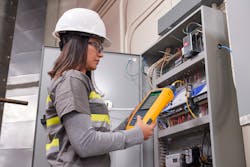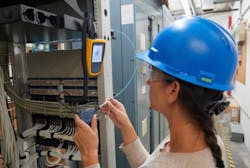Protect Your Industrial Network Investment for Decades
Automated systems depend on networked communications among devices. The digital transformation of industry is placing increased importance on these networks due their integral role—not just in ensuring data gets from one component to the next but supporting remote connections to the data being handled by the facility’s cabling plant.
If you’re not familiar with the term cabling plant, it is “the complete system of cabling and associated hardware deployed to transmit electrical and optical signals between active communication equipment,” according to Electrical Construction & Maintenance.
With so much business value riding on the dependability of the network, there is growing interest in cabling plant warranties.
Though the cost of a structured cabling plant is typically only about 15% of the cost of a total network deployment, it is the most challenging and expensive part of the network to replace, Mullins says. Upgrades to structured cabling plants “require extensive labor and significant disruption to a workplace,” he adds. “Therefore, it should have the longest lifecycle.”
Warranty requirements
To obtain a cabling plant warranty, nearly all cabling system manufacturers require certification testing.
“We require 100% certification testing as objective evidence that our products and systems were installed properly, which is critical for Siemon to offer a 25-year performance and application warranty,” says Dave Valentukonis, north American technical services manager for Siemon (a supplier of high-performance IT infrastructure products and services).
One hundred percent certification testing means that once installed, every link must be tested to ensure compliance with a specific category or class of cable, as determined by parameters and channel limits outlined in ANSI/TIA-568 or ISO/IEC 11801 cabling standards. For copper twisted-pair category cabling, this includes factors such as insertion loss, return loss and crosstalk parameters. For fiber, it means testing for continuity, polarity, length, insertion loss (Tier 1 certification), backscatter, reflectance and optical return loss (Tier 2 certification). Certification testing is often not required for pre-terminated cabling systems that are pre-tested at the factory.
If you’re looking to obtain a cabling plant warranty for your facility, be aware that cable manufacturers also often require the cabling BOM (bill of material). Mullins says manufacturers typically require “BOM proof that every component [in the cable plant] was theirs and most necessitate installation by one of their certified installers. Many even require installers to be BICSI (a professional association supporting the information and communications technology profession) certified, with an RCDD (registered communications distribution designer) on staff.
About the Author
David Greenfield, editor in chief
Editor in Chief

Leaders relevant to this article:




